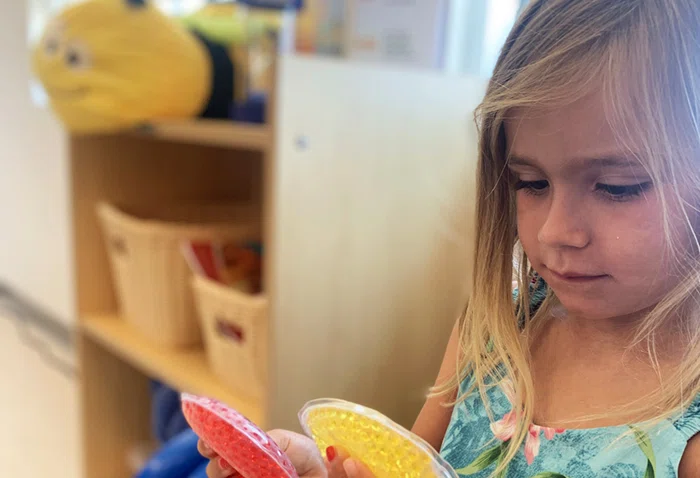
Each classroom at Hermosa View School is equipped with a “Dolphin Den,” a calming corner where students can take a break to refocus.
Sensory-integrated school teaches self-regulation skills to students
February 26, 2024
The following was written by Sylvia Gluck, director of Administrative Services with Hermosa Beach City School District.
The aftermath of the COVID-19 pandemic on students’ social-emotional well-being changed the educational landscape for school administrators and teachers across the country. Upon students eagerly returning to school, staff at Hermosa View School noticed an uptick of social-emotional and behavioral dysregulation of students.
Hermosa Beach City School District, branded the “Best Little Beach School” located in the suburbs of Los Angeles County, maintains an average daily attendance of 1,347. Three schools are located within a 1.3-square-mile community which provides educational services for preschool through eighth grade students. Hermosa View School is home to approximately 366 of our youngest learners, which span preschool through first grade.
When students returned to school after the pandemic, it was noticeable that many students had trouble completing school-based tasks that required them to sit still, attend to instruction, engage with peers or work cooperatively in groups. It was evident that some of our youngest students struggled with emotional dysregulation exhibited by non-compliance and negative behaviors.
As a result, district leadership, in conjunction with site and school leaders, focused on frameworks from California Social Emotional Learning (CASEL) and considered information from “Sensory Spaces in School” from the National Council for Special Education to develop behavior strategies and interventions to address school readiness and social-emotional wellness. Input from special education specialists, teachers and administrative leaders explored ways to incorporate, develop and design sensory spaces with all areas of the school, as we believe this benefits students who are stressed or exposed to trauma, and provides an output for students with sensory and social-emotional needs.
For the 2023-24 school year, Hermosa View School is committed to being a school site where sensory spaces and tools are available to all students within an inclusive setting. Introducing sensory spaces and implementing strategies for self-regulation, Hermosa View’s goal is to support student engagement, teach student self-regulation skills and increase student participation in the learning environment. When transforming our traditional school site into a sensory space, key areas were taken into consideration.
Designated sensory spaces: When looking at students who range from 3-7 years of age, optimizing student learning and providing age-appropriate tools for self-regulation was a priority. Leadership from the school site and district relied heavily on our school counselor, school psychologist and occupational therapist for brainstorming opportunities on what we wanted to provide for students. Ultimately, we landed on wanting it all, which included classroom-based sensory spaces, an outdoor sensory space and implementation of a sensory pathway, along with providing a wellness center.
Classroom-based sensory space: In 2023 Hermosa View School started small with the implementation of sensory boxes in each classroom that were funded by a grant from our local Parent Teacher Organization. For the 2023-24 school year, we have expanded schoolwide calming corners, dubbed as the “Dolphin Den,” within every classroom in the school. Each classroom was provided with a large bean bag, weighted Clifford the Dog stuffed animal, a vibrating bumble bee, kinetic sand and fidgets to provide students with individualized sensory input needed for self-regulation. Special education staff provided professional development to staff along with how to proactively incorporate the sensory space into the class routine.
Outdoor sensory space: The playground can be overwhelming for some students. Sensory input can be unpredictable, loud and overwhelming. Jason Johnson, superintendent of Hermosa Beach City School District, suggested the school consider a sensory garden to be added. With the financial backing of the district, the “Dolphin Cove” is scheduled to be unveiled to students soon. We have developed a fenced area within the playground area where students can access heavy duty playground equipment that will encourage proprioceptive input or allow them to chill out.
Sensory pathways: The district’s occupational therapist wrote a special project grant to the Hermosa View/Vista/Valley Parent Teacher Organization to fund a sensory pathway to provide input for students as they transition from indoors to outdoors and for students who need a movement break. Hermosa View School’s occupational therapist created a video for teachers to reference on how and when to use the sensory pathways.
Wellness center: The district and school leadership have prioritized student wellness and maintain two full-time counselors to service students. The implementation of a student wellness center for our youngest learners provides opportunities for students to participate in yoga, focus on social skills during friendship club at lunch, and provide opportunities for students to use gross motor skills while participating in a dance party or work on fine motor skills by participating in a themed art project on any given day. The wellness center includes various types of furniture to meet the needs of students: rocking chairs, standing desks and sensory hideaways.
Lessons learned: When considering transitioning sensory integration throughout a campus and into a school culture, it is important to prepare and create a multi-year plan. Our metamorphosis did not happen overnight but occurred slowly and methodically as we looked at what worked and what did not work for our student population. Collaboration and input from staff and administration was pivotal along with strategic professional development that has proven to be effective in our journey with implementing responsive practices to support student self-regulation and social-emotional wellness.
Sylvia Gluck is director of Administrative Services with Hermosa Beach City School District.
A rendering of the “Dolphin Cove,” an enclosed sensory garden.
Sensory pathways are available outside for students.
TK classrooms received flexible seating this year.
Students self-regulate by choosing items from the “Dolphin Den” to provide increased opportunities for inclusion.
ADVERTISEMENT



